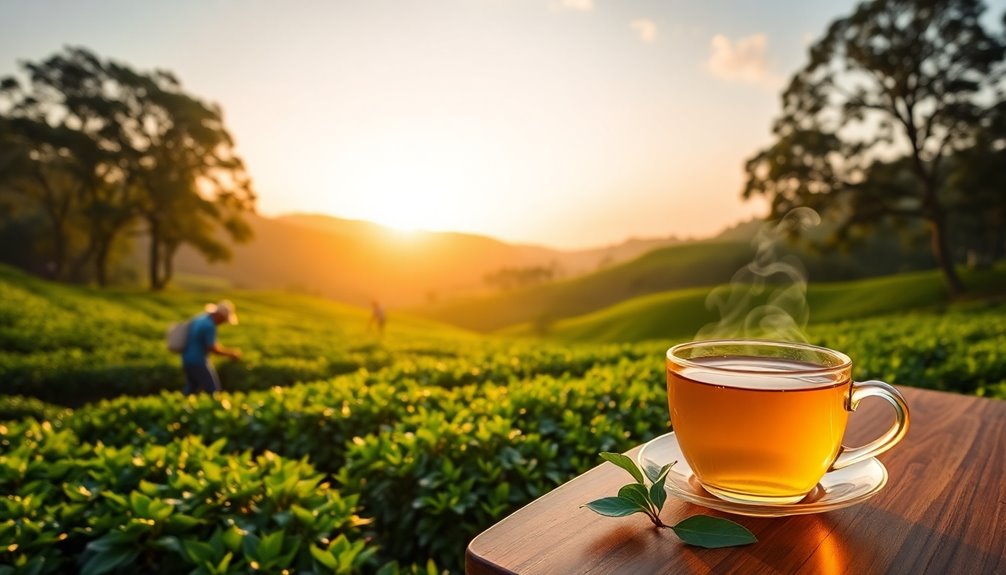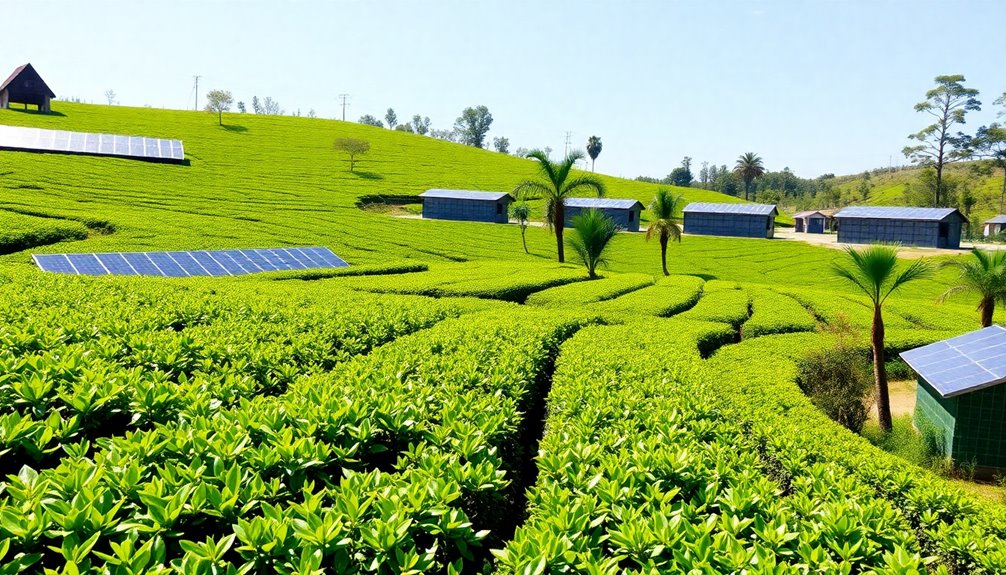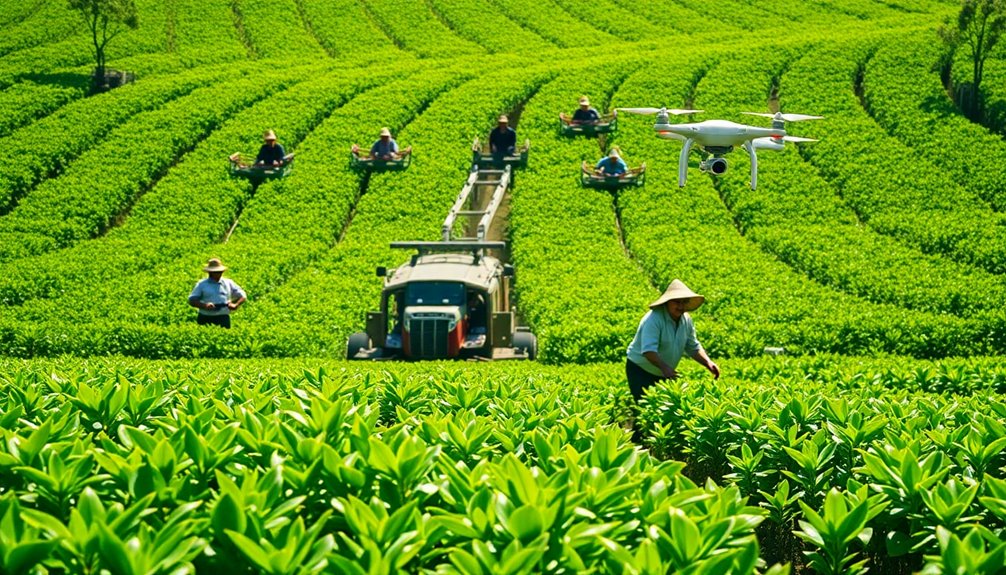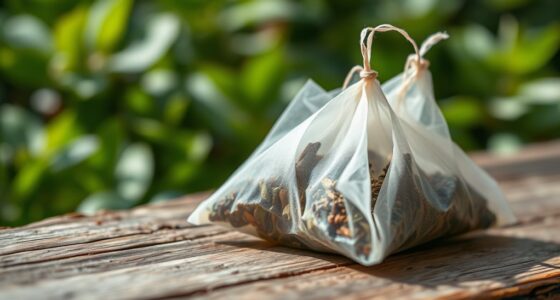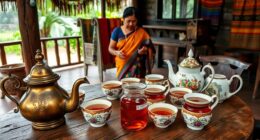Your choice of tea can truly make a difference! When you pick ethical brands, you're helping farmers earn fair wages and enjoy safer working conditions. Many tea workers struggle with unfair pay and harsh conditions, so buying Fairtrade tea supports positive change. Plus, ethical farming protects our planet by promoting biodiversity and reducing harmful chemicals. This means healthier soil and safer water for everyone. So, every cup counts! Look for brands like Clipper and Cafédirect that care about people and the environment. It's exciting to know you can make an impact with each sip—discover even more ways to help!
Key Takeaways
- Ethical tea consumption can improve wages and working conditions for workers, but only a few brands primarily offer Fairtrade options.
- Conventional tea farming practices harm biodiversity through monoculture and pesticide use, while sustainable methods can enhance local ecosystems.
- Tea production contributes significantly to climate change, emphasizing the need for sustainable practices to reduce emissions and conserve water.
- Supporting brands like Clipper and Cafédirect that prioritize ethical practices can make a positive impact on tea workers and the environment.
- Choosing organic and loose-leaf teas not only benefits health and sustainability but also reduces waste associated with traditional teabags.
Introduction

Sipping your favorite cup of tea might seem like a simple pleasure, but there's a complex story behind every leaf. Did you know that the UK consumes an astounding 70,000 cups of tea every second? This means that ethical tea consumption is super important! It helps tackle human rights abuses and environmental issues linked to tea production.
Sadly, many tea workers face unfair wages, unsafe working conditions, and even child labor in places like Assam, India.
When you choose tea brands that offer Fairtrade options, you're making a difference! Only 3 out of 19 researched tea brands mainly provide Fairtrade tea, so being aware of your choices is essential.
Ethical certifications like Fairtrade and organic ensure that workers earn better wages and work in safer conditions. Plus, they promote practices that are kinder to our planet.
Tea's Impact on Biodiversity
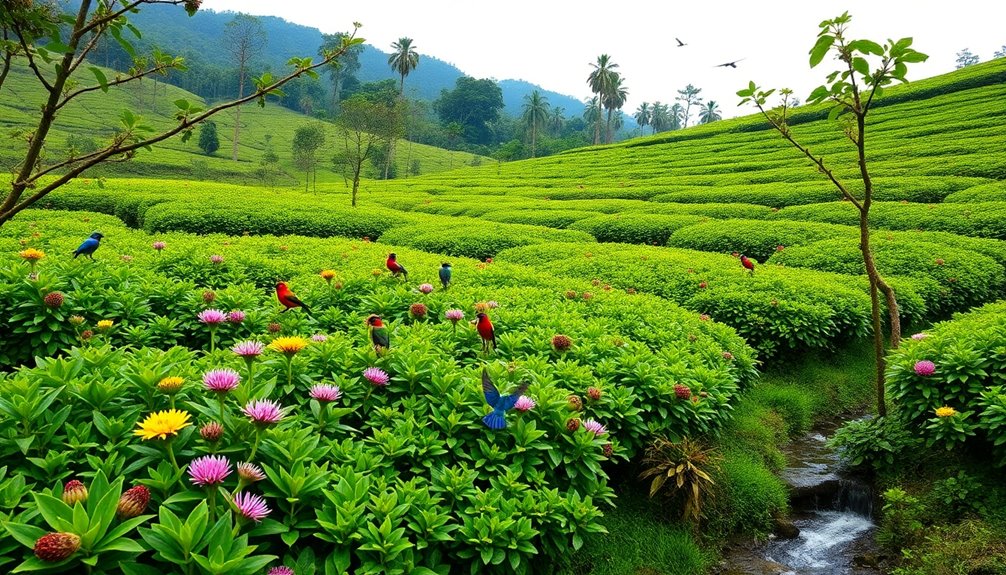
While enjoying your cup of tea, it's important to recognize the impact its production has on biodiversity. Most conventional tea cultivation uses intensive monoculture practices. This means only one type of plant is grown, which can harm local wildlife and reduce the variety of species in the area.
The use of harmful pesticides and fertilizers also affects the soil and water, making it tough for plants and animals to thrive.
On the other hand, choosing ethical and sustainable tea can make a big difference! Sustainable farming methods, like polyculture and organic practices, help support a wider range of plants and animals.
This means that tea plantations can actually boost biodiversity instead of hurting it.
Fairtrade Tea Brand Scarcity
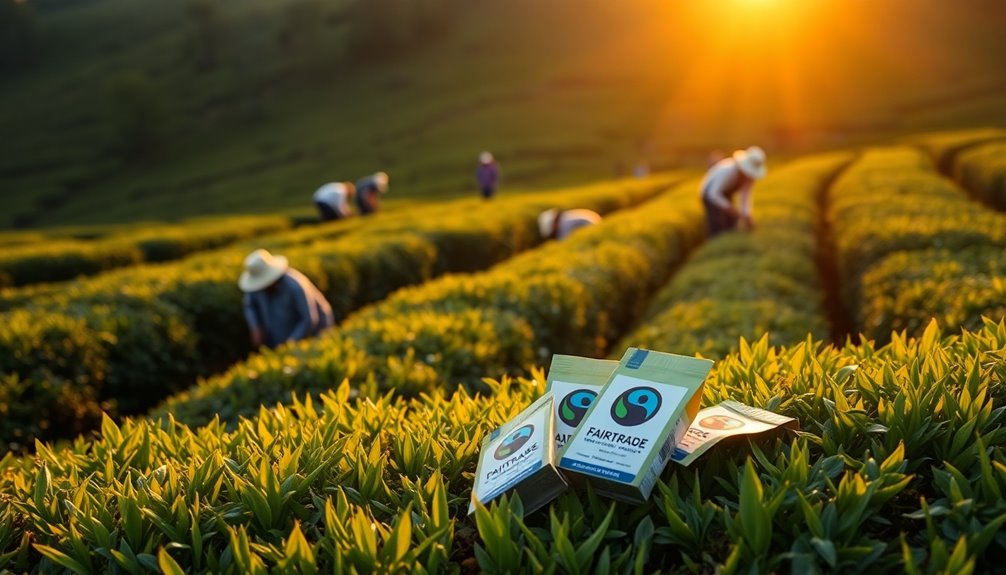
The connection between biodiversity and ethical tea production extends to the scarcity of Fairtrade options in the market. Did you know that only 3 out of 19 researched tea brands mainly offer Fairtrade tea? This shows just how limited your choices can be when looking for ethical tea!
Fairtrade certification is essential because it promises better wages and working conditions for tea plantation workers. Sadly, many brands still source from suppliers with poor practices.
Even with rising awareness of Fairtrade, some workers on certified farms earn less than the legal minimum wage. That's frustrating! You might think you're making a difference, but there are still gaps in workers' rights.
Reports show ongoing issues, like harassment of female workers on some Fairtrade plantations, which highlights that the system needs improvement.
You might wonder why there's not a big difference in wages between Fairtrade and non-Fairtrade plantations. It's mainly because the current certification isn't enough to tackle the main challenges in the tea industry.
Tea's Role in Climate Change
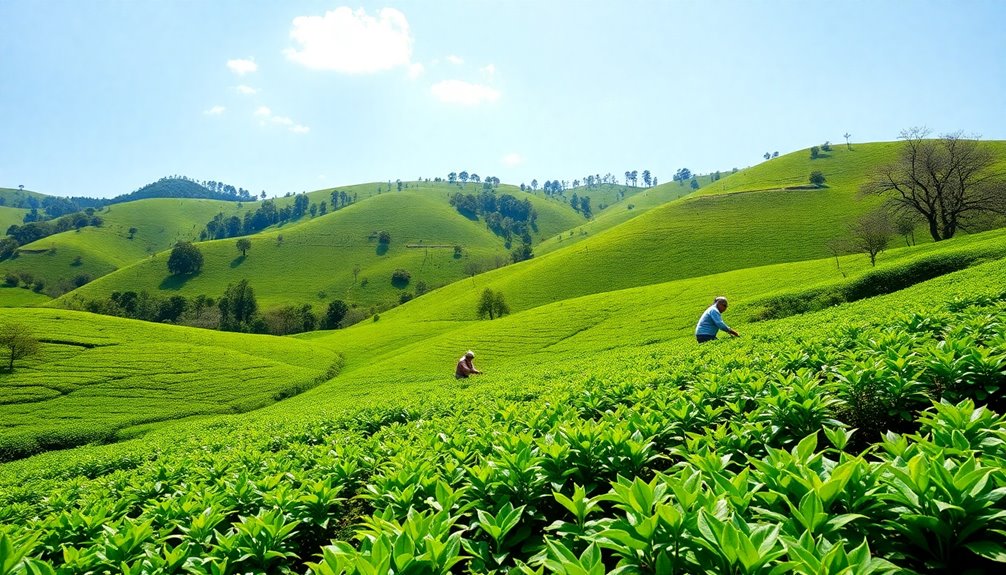
Over the years, tea production has increasingly contributed to climate change, accounting for about 4% of global agricultural greenhouse gas emissions. That's a big number! You mightn't realize it, but the way tea is grown can seriously impact our planet.
For instance, producing just one kilogram of tea needs around 4,000 liters of water. This can stress local water supplies and hurt nearby communities.
Additionally, deforestation for tea plantations leads to habitat loss for many animals and plants. This hurts biodiversity and can make climate change effects even worse. Many tea growers use intensive methods, which can harm soil health. This makes it easier for pests and diseases to thrive, adding more challenges.
However, there's hope! Switching to sustainable farming practices, like organic tea cultivation, can help reduce carbon footprints. It's an ethical choice that supports local communities and promotes environmental resilience.
By choosing Fair Trade or organic tea, you're making a difference. You're supporting a healthier planet and better working conditions for tea growers.
Labor Exploitation in Tea Production
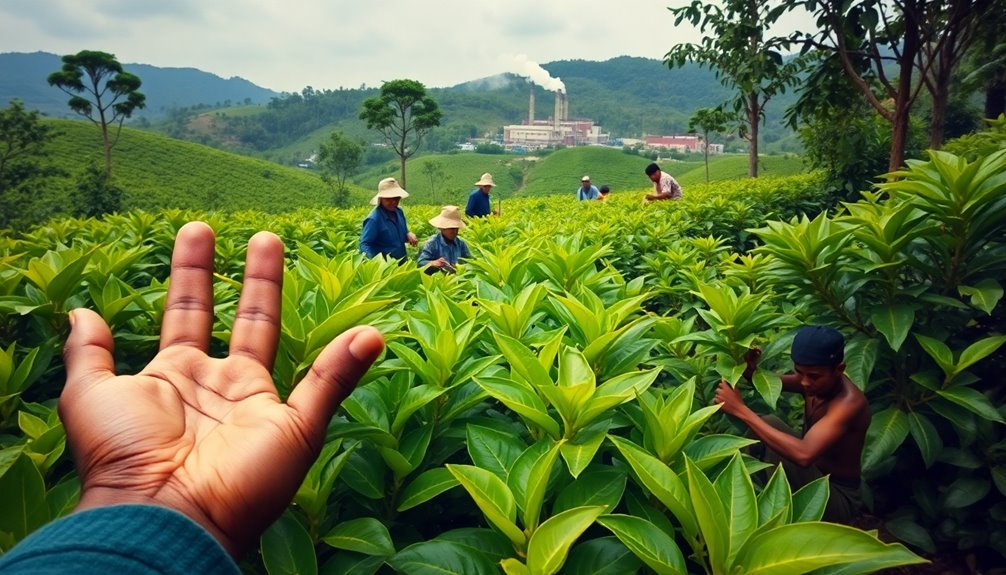
Labor exploitation remains a pressing issue in tea production, particularly in regions like Assam, India. You might be surprised to learn that many tea workers earn as little as £1-2 per day. That's far below the legal minimum wage of £3! This highlights the systemic labor exploitation in the industry.
These workers, who often live below the poverty line, face poor working conditions every day.
Female workers make up a large part of the labor force on tea plantations. Sadly, they often deal with inadequate wages and lack basic facilities and protections. Reports from Oxfam India reveal that human rights abuses, including harassment, are common in these areas.
The history of tea production is filled with exploitation, with many workers descended from indentured laborers. This has created a cycle of poverty and denied rights that's hard to break.
While Fairtrade options exist to help improve conditions, the truth is that many tea plantations still fall short of protecting their workers. By choosing your tea wisely, you can support better practices and help make a difference for tea workers everywhere!
Practical Applications
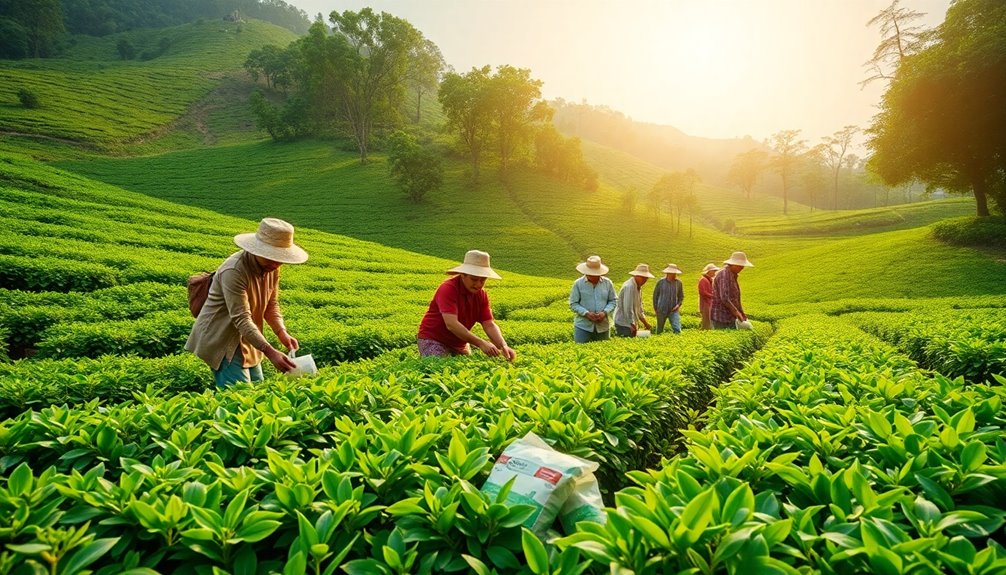
Choosing ethical tea brands can have a significant impact on improving conditions in the tea industry. When you opt for Fairtrade tea, you're directly supporting better wages and working conditions for tea producers. It's exciting to know that your choice can help create a fairer world!
Plus, many brands like Clipper and Cafédirect are recognized for their ethical practices, so you can feel good about your selection.
Also, think about choosing organic teas. These avoid harmful pesticides and fertilizers, which is great for environmental health and biodiversity. You're not just enjoying a delicious cup; you're helping the planet too!
And have you tried loose-leaf tea? It tastes amazing and reduces waste from teabags. What a win-win!
You can also make a difference by asking larger brands for transparency in their sourcing. Join initiatives like Traidcraft's Who Picked My Tea campaign to raise consumer awareness. The global tea market's increasing focus on sustainable practices reflects a growing consumer demand for ethically sourced products.
Each time you sip your tea, remember, you're part of a movement encouraging sustainable practices in the tea sector. So, go ahead, choose wisely, and enjoy your tea knowing you're making a positive impact!
Frequently Asked Questions
Which Tea Brand Is Most Ethical?
When choosing the most ethical tea brand, consider Clipper, Cafédirect, and Wunder Workshop. They excel in sustainable practices and fair worker treatment, ensuring your tea choice supports both the environment and the people behind it.
Why Does a Cup of Tea Make Everything Better?
When you sip a warm cup of tea, it comforts you, calms your mind, and invites relaxation. The ritual itself fosters mindfulness, enhancing your mood and creating connections with others, making everything feel a little better.
Is Tea More Ethical Than Coffee?
When you compare tea and coffee, tea often faces greater ethical challenges, particularly regarding labor rights. You'll find more Fairtrade and organic coffee options, making it easier for you to make ethical choices with coffee.
Is Lipton Tea Ethical?
When you consider Lipton tea's ethicality, you should weigh its sustainable sourcing claims against reports of poor labor practices and environmental concerns. Your choice impacts both workers' lives and the planet's health. Think carefully before buying.
Conclusion
So, the next time you sip your tea, think about its journey! Your choice can help protect nature, support fair wages, and tackle climate change. By picking brands that care, you're not just enjoying a tasty drink—you're making a difference! Every cup counts, and together, we can help create a better world for tea farmers and our planet. Let's raise our mugs to a brighter future, one delightful sip at a time! Cheers!

